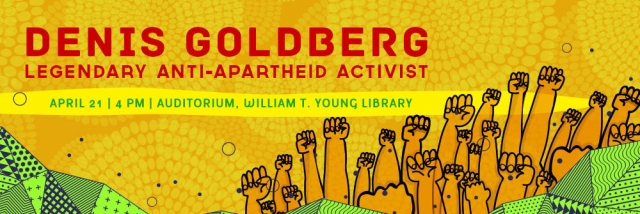A&S Student Recognized for Exceptional Service
Andrew Ritzel won this year's Sullivan Award for his work in the Alternate Spring Break Program.
Andrew Ritzel won this year's Sullivan Award for his work in the Alternate Spring Break Program.
During WWII, Chaïm Perelman (1912-1984) helped found and lead the Comité de Défense des Juifs (Jewish Defense Committee), which saved the lives of 5,000 Belgian Jews. In 1947, Perelman founded the New Rhetoric Project as a response to the Holocaust and the failure of reason to prevent violence and war. In 1958, Perelman and his colleague Lucie Olbrechts-Tyteca published The New Rhetoric: A Treatise on Argumentation, which established the anchors of a new rhetoric, founded on informal logic and featuring the technique of dissociation. Professor Frank will place the New Rhetoric Project in its historical context, argue it is a Jewish rhetoric and the most important rhetoric of the 20th century, and that dissociation is a brilliant yet undeveloped notion.
This will be a celebration event for all that was accomplished during the week. Prizes will be given, etc., and it can count as a Wired event!
Reversing Trajectories will take place on April 16th, 17th and 18th. This conference will focus on the substantive links between incarceration and violence and their political results. We also have a subfocus of the conference on trajectory analysis (download and install) which is a useful tool in empirically studying these issues.
Visit the QIPSR website for more information.
Wednesday, April 16th , 2014
4:30 PM-6:00 PM POT 1506
Dominique Zephyr, Statistics Advising Laboratory, University of Kentucky
Using Trajectory Analysis in STATA – TRAJ do file here
Thursday, April 17th , 2014
8:45-9:00 AM: President’s Room of the Singletary Center for the Arts
Introduction: Thomas Janoski, Director of QIPSR
Logic of the Conference, Claire Renzetti, Chair of the Sociology Department, UK.
9:00-10:30 AM: President’s Room of the Singletary Center for the Arts
Traci Burch, Political Science, Northwestern University.
Trading Democracy for Justice: Criminal Convictions and the Decline of Neighborhood Political Participation
Discussant: Mark Peffley, Political Science, University of Kentucky
10:45 AM-12:15 PM President’s Room of the Singletary Center for the Arts
Christopher Wildeman, Sociology Department, Yale University.
Children of the Prison Boom or Detaining Democracy
Discussant: Brea Perry, Sociology, University of Kentucky
12:15-1:00 PM BOX LUNCH President’s Room of the Singletary Center for the Arts
1:00 PM to 2:30 PM President’s Room of the Singletary Center for the Arts
Alex Piquero, Professor of Criminal Justice, University of Texas at Dallas.
Criminal Trajectories and Human Capital
Discussant: Carrie Oser, Sociology, University of Kentucky
2:45 to 4:00 PM President’s Room of the Singletary Center for the Arts
Amy Lerman, Goldman School of Public Policy, University of California, Berkeley,
Punishment and Political Psychology.
Presider: Abby Cordova, Political Science, University of Kentucky
FRIDAY, APRIL 18th, 2014
8:30-8:50 AM, Continental Breakfast, Ovids around the corner at the W. T. Young Library
9:00-10:30 AM, W. T. Young Library Auditorium, 1st Floor.
Robert Apel, School of Criminal Justice, Rutgers University
The Role of the Labor Market in the Criminal Career
Discussant: Janet Stamatel, Sociology, University of Kentucky
11:00 AM-12:30 PM W. T. Young Library Auditorium, 1st Floor.
Policy Recommendations
Traci Burch, Political Science, Northwestern University.
Alex Piquero, Professor of Criminal Justice, University of Texas at Dallas.
Amy Lerman, Goldman School of Public Policy, University of California, Berkeley
Presider: Justin Wedeking, Political Science, University of Kentucky

In 1964, Goldberg, alongside Nelson Mandela and six others, were tried and convicted for trying to overthrow the apartheid regime in South Africa. He spent the next 22 years in prison, and was released in 1985 on the condition that he be exiled from his native South Africa to Israel.
After his release, Goldberg instead traveled the world organizing international opposition to apartheid, becoming a spokesperson for the African National Congress, then the leading anti-apartheid organization and current ruling party of South Africa. Since South Africa's transition to democracy in 1994, Goldberg founded Health Education and Reconstruction Training (H.E.A.R.T.), a nongovernmental organization that supports local initiatives aimed at improving health, education and reconstruction in contemporary South Africa.
Goldberg's talk will highlight pivotal episodes in his life as a leading member of the anti-apartheid struggle, as recounted in detail in his recent autobiography "The Mission: A Life for Freedom in South Africa" (STE Publishers, 2010).
 Jody Miller, Professor of Criminal Justice at Rutgers University, examines how inequalities of gender, race, and class shape young women’s participation in crime and risks for victimization. Her books include the award winning Getting Played: African American Girls, Urban Inequality, and Gendered Violence (NYU Press, 2008) and One of the Guys: Girls, Gangs, and Gender (Oxford University Press, 2001).
Jody Miller, Professor of Criminal Justice at Rutgers University, examines how inequalities of gender, race, and class shape young women’s participation in crime and risks for victimization. Her books include the award winning Getting Played: African American Girls, Urban Inequality, and Gendered Violence (NYU Press, 2008) and One of the Guys: Girls, Gangs, and Gender (Oxford University Press, 2001).
Physicist Juan Maldacena of the Institute for Advanced Study will visit the University of Kentucky Friday and will deliver the 2014 van Winter Memorial Lecture in Mathematical Physics.
Political science junior and UK Women's Tennis player Grace Trimble has been named a 2014 Truman Scholar and will receive $30,000 to conduct graduate work in areas of public service.
When many people think about Kentucky, bourbon is one of the first things to come to mind. While bourbon, wine, and beer are popular staples in Kentucky, many people hold misconceptions about how it is produced. Bert Lynn, a professor of Chemistry, hopes to dispel many of these myths while also introducing his students to the history and chemistry of beer, wine, and distilled spirits in his course, Spirit Chemistry.